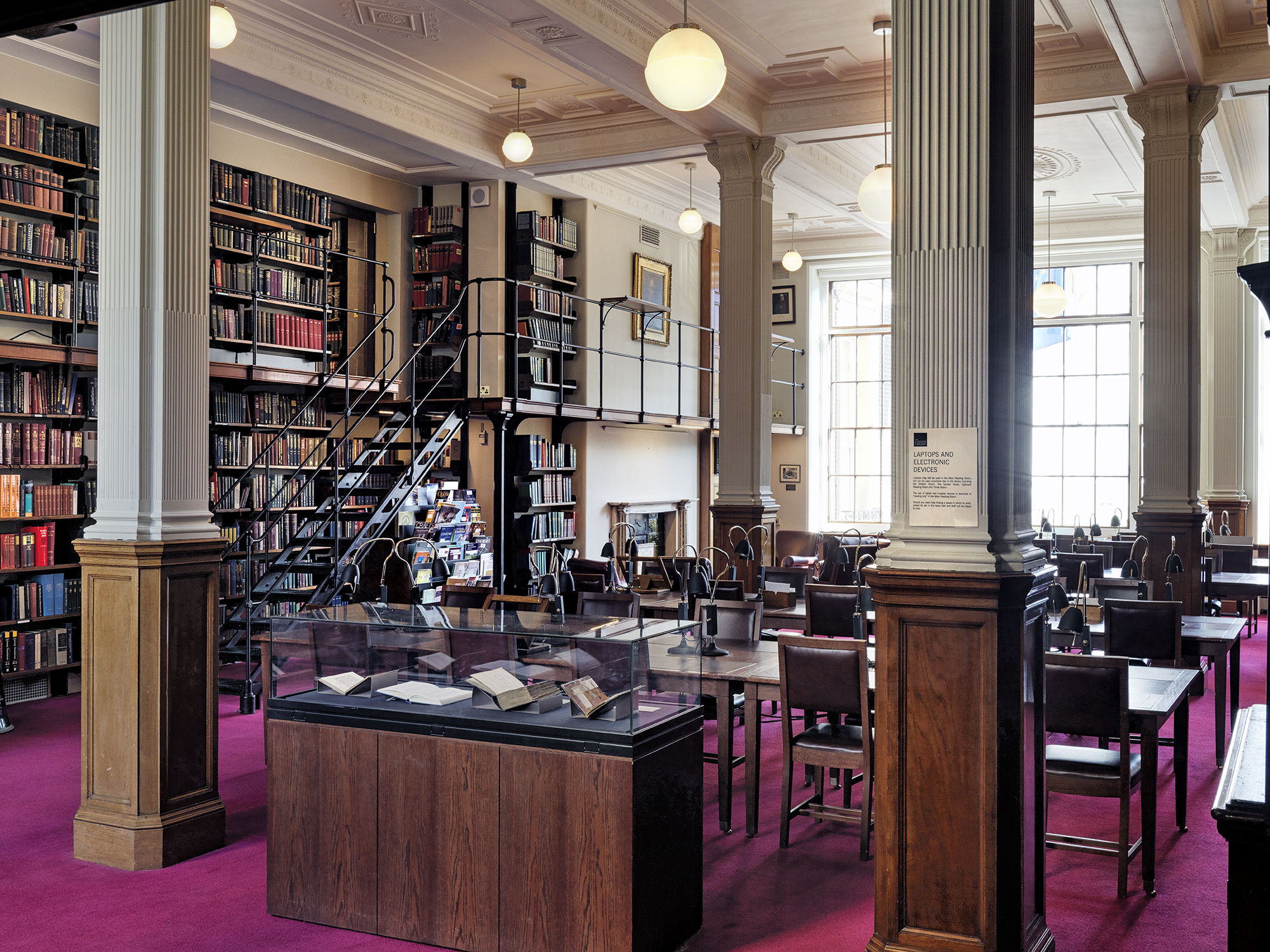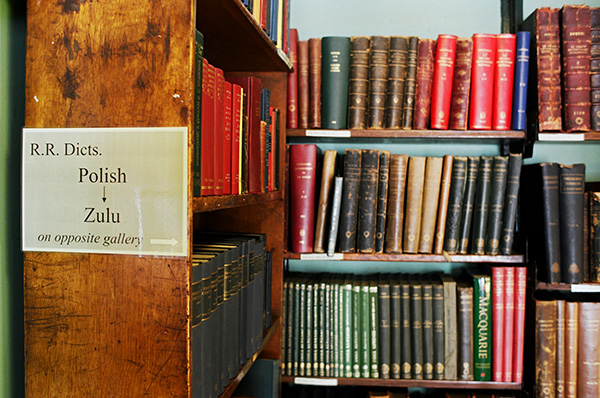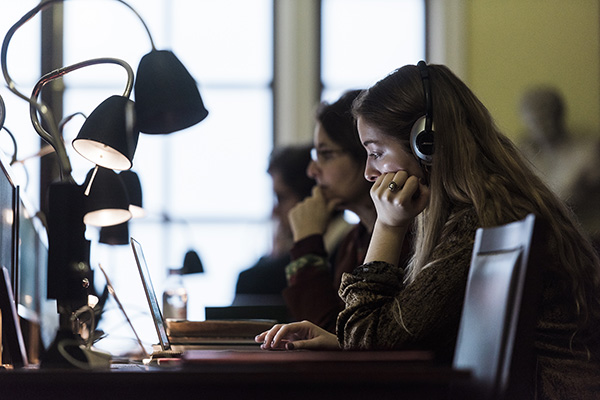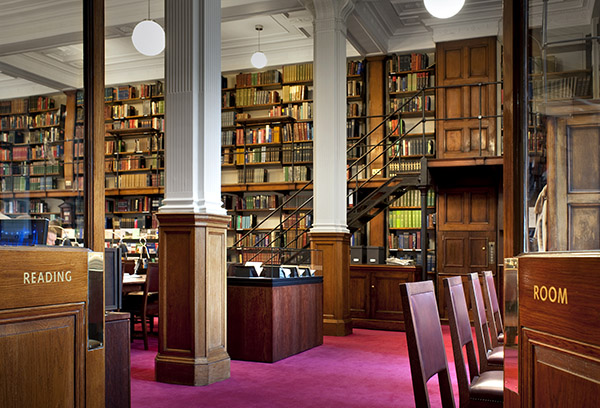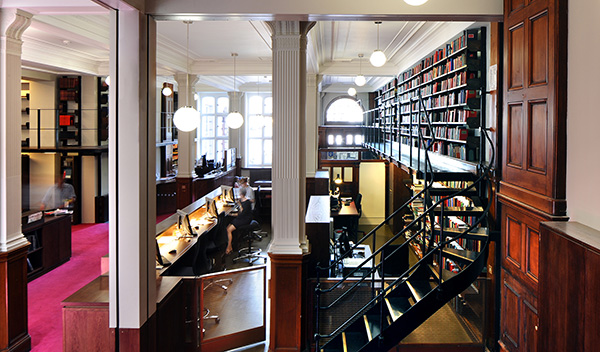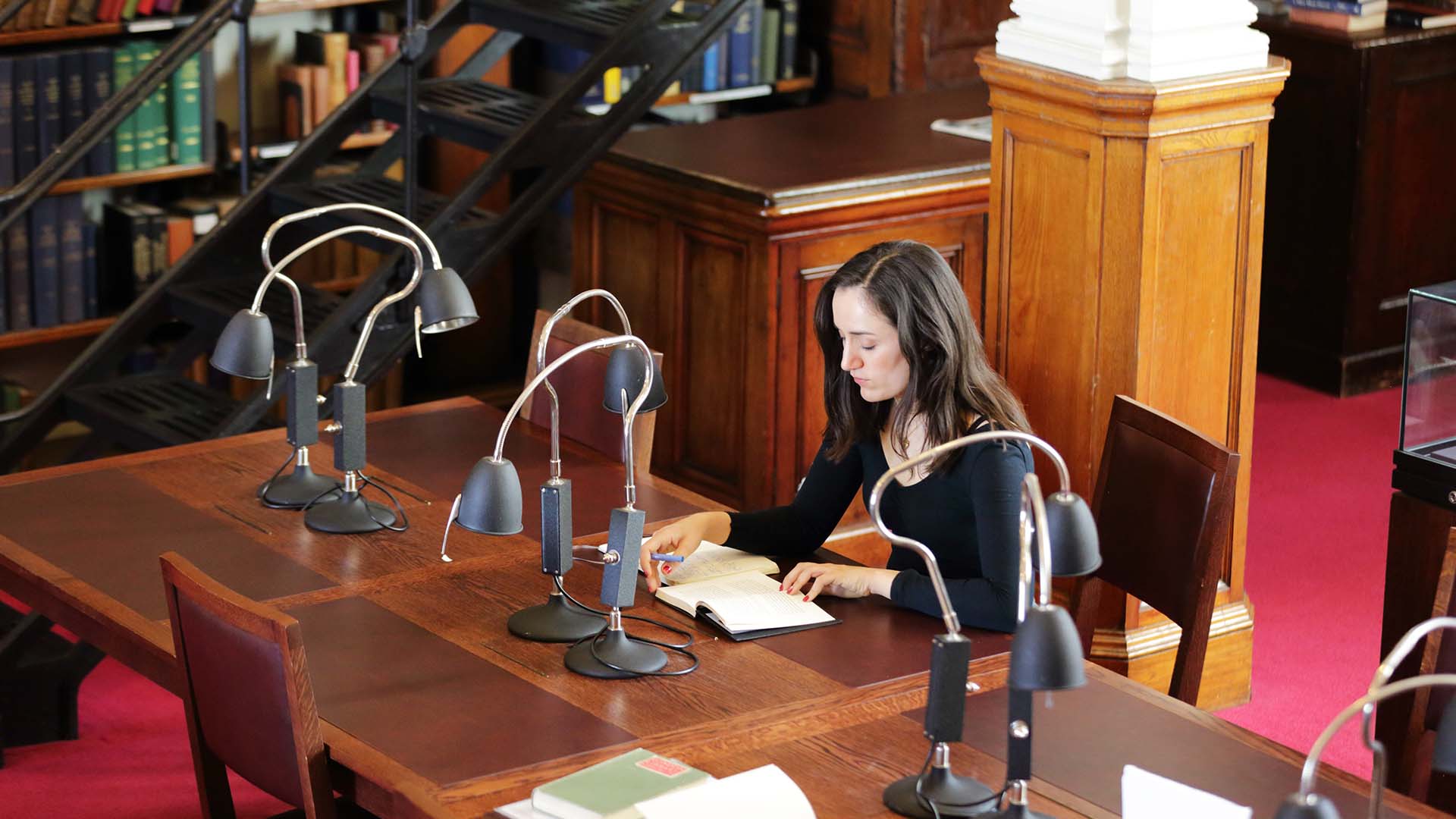
Members of the Library who want to browse the sports section need to climb up to the 6th floor of the back stacks. Upon arrival the intrepid reader will face dark metal shelves that in the gloom appear to float between aisles of green glass lit from below. A quick scan of the stack board signs will show that S. Sports &c. (the ‘&c.’ in this case stands for pastimes) naturally lies between S. Spies &c. and S. Stamps. Where else?! After musing on the possible connections between secret agents, philately and international sporting events he or she can finally take a closer a look at what S. Sports &c. has to offer.
Almost 400 books occupying thirteen and a half shelves (plus a few more volumes in the quarto sequence, which is one floor below) will satisfy the reader’s curiosity on everything from playground games to kite flying, darts, surfing, Scrabble, Olympic Games, snooker, croquet, backgammon, table tennis and even rat-catching! The reader may well wonder at the person who decided to shelve the Full Revelations of a Professional Rat-catcher, after 25 Years’ Experience under sports and pastimes. In fact, the book’s presence in this section illustrates the challenges London Library cataloguers face every day when trying to classify a book on a subject for which Sir Charles Hagberg Wright, Librarian from 1893 to 1940 and the genius behind the Library’s unique scheme, did not create a shelfmark!
Oddities aside this section is typically comprehensive, in true London Library fashion, in its treatment of the subject of sports and pastimes. The earliest book one can borrow from these shelves is a 1730 edition of Académie Universelle des Jeux, a compendium of instructions on all the fashionable games played at the court of Louis XV and Madame de Pompadour while one of the most recent ones is the Cambridge Companion to Baseball.
Some members may be surprised by the absence of books on cricket, particularly after seeing at least three other books on baseball in this section. This is far from being an unforgivable oversight, quite the opposite. As many members would agree, cricket is far too important to sit among other works in S. Sports &c and as such it has a section of its very own, S. Cricket, boasting some 260 books.
Going back to S. Sport &c. we can see that while the books shelved here were published over 300 years the period they cover is much, much broader. There are books on gladiatorial combats in ancient Rome, on sports and games in ancient Egypt, on Aztec competitions, and on chariot racing in the Byzantine Empire alongside works on French games from the 16th to the 18th centuries, on the ‘accomplishments and pastimes of the English gentleman’ from 1580 to 1630, on ‘gamesters of the Restoration’, on sport in Georgian England and on the Edwardians at play. The evolution of the subject is brought up-to-date with books on sport in the USSR and other countries behind the Iron Curtain as well as a book on the role of commercial giants like Adidas and Puma in ‘the making of modern sport’. The geographical coverage of the section is no less impressive and the social historian will also find plenty of source material here.
Of course, this is not all that the Library has to offer on the subject of sports and pastimes. We have already seen that books on cricket merit a shelfmark of their own and the same applies to books on archery, athletics, ballooning, billiards, boxing, canoeing, chess, cycling, fencing (under S. Duelling &c.), fishing, football, gaming, golf, hockey, hunting, mountaineering, polo, racing, riding, rowing, shooting, skating & skiing, swimming, tennis, wrestling, yachting!
Still, if we want to find our books on the Olympics we need to return once more to S. Sports &c. This is where we’ll find both official reports of the modern games as well as studies on their political significance, particularly when it comes to Hitler’s manipulation of the 1936 Berlin Olympics. Other books deal with the horrific events that took place in Munich in 1972 and the tension between the Communist and Olympic ideals of Beijing 2008.
Perhaps the most fascinating of all is the first book ever published on the modern games: The Olympic Games, B.C. 776-A.D. 1896. The work in two volumes is in itself a perfect example of international cooperation. With parallel text in German and English the book was co-published in Athens, Leipzig and London over 1896 and 1897 to coincide with the first modern Olympic Games. The first volume is a history of the games in ancient times written by Spyridōn Paulou Lampros and Nikolaos Politēs with the second volume being an account by Pierre de Coubertin and Timoleon Philemon of the 1896 games celebrated in Athens. A view of the host city, including the ‘stadion’ purposely rebuilt over the ruins of the ancient arena decorates the cover and inside there are many portraits of victorious athletes, such as Aristides Constantinidhis, winner of the cycling race from Athens to Marathon and back. The image shows him balancing on his bike and sporting the obligatory handlebar moustache. The facing page is taken up by a panoramic view of the ‘stadion’ filled with spectators cheering the triumphal arrival of Marathon runner Spyridon (“Spyros”) Louis, flanked by Princes Constantine and George, who overcome by joy rushed onto the track to join the him for the last few metres. The illustration captures the moment a Greek national hero was born. Because this quite a rare work (only three others are listed on Copac at the time of writing) it now lives in one of the Library’s safes but can still be consulted under supervision.
A commemorative volume that can be borrowed is the Olympic Games London, 1948 : Official Souvenir. This was London’s second turn in hosting the games and once again there was little time for making the necessary preparations. The 1908 Games had been allocated to Rome but the plans changed at the last minute leaving London only two years to get ready for the friendly invasion. When preparing for 1948, things again had to be done in a hurry: on page 19 the booklet explains the absence of a great, specially built arena in London as ‘such a building would take many years’ planning and building and this country was, until 1945, otherwise occupied.’ The booklet, which opens with an essay on the ancient games, followed by brief histories of previous modern games includes a colour map of London showing which events will take place where. Despite being known as the ‘Austerity Games’ the colourful booklet oozes post-war optimism and a desire to let bygones be bygones: the description of the 1936 Berlin Olympics is full of gallant praise for the organisers of the German Games. Each of the events or sports included in the 1948 Games is then explained and blank tables have been printed where the owner of the booklet can write the names and scores of winning competitors. A great portion of the little volume is made up of adverts for all kinds of products, from support underwear to cigarettes, brandy, fountain pens and luxury cruises.
Thank you for entering our competition.
A winner will be selected at random and we will be in touch ASAP.

The London Library is a haven for reading, writing and thinking and Remote Access membership is perfect for anyone that would like full access to our collection of over a million books, eBooks via Overdrive and thousands of eResources from the comfort of home. It's the perfect solution for those lockdown blues and now you can win a year of FREE membership!*
To enter our competition share a photo of your cosy home reading nook and tag us on Twitter, Facebook or Instagram, then leave your email address below.
The London Library promises to respect and protect any personal data you share with us. Your email address will also be used to select a competition winner and send a membership offer to unsuccessful applicants, the data will then be deleted. You can opt-out of most communications or the ways in which we process your data by contacting This email address is being protected from spambots. You need JavaScript enabled to view it.. For full details of how we collect, store, use and protect your data, see our Privacy Policy at www.londonlibrary.co.uk/privacypolicy.
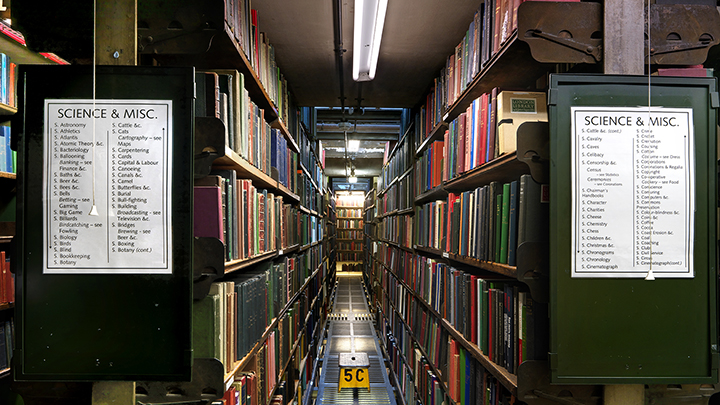
Our Book Collection and Postal Loans
The London Library has over one million books dating from 1700 to the present day, from rare publications to the most recent fiction and non-fiction releases, all waiting to be borrowed.
Our collection covers history - from ancient to modern: political, ecclesiastical, topographical, constitutional, social, economic, military and more; culture - literature, language, the arts and thought and life - philosophy, religion, folklore, social science, political science, political economy. There are also books in a huge range of niche subjects, from camels to devils, flagellation to human sacrifice, and pawn shops to tunnels. You've not experienced a library until you've looked at The London Library's weird and wonderful books!
Browse our bookshelves, read in the Library, or take them home - London Library members can experience our collection straight to their door! While our building restrictions are in place we are also posting books to members free of charge, simply search our online catalogue, request the books and we will post them to you.
Our Online Resources
Our extensive online resources bring together millions of pages from thousands of journals, periodicals, newspapers and databases. They comprise over 25,000 fully searchable information sources.
Literary resources
An extensive collection of literary journals and collections is available if you’re looking to stay in touch with the literary world. London Library membership gives access to titles such as the complete archive of The London Review of Books, New York Review of Books, English Poetry, The Complete Prose of T S Eliot archive, Early English Books Online and many more.
Academic resources
Through JSTOR you can access a huge digital library of academic journals, books, primary sources and periodicals. Members also have access to a vast collection of historic research material through hundreds of publications.
Newspaper archives and historic publications
You’ll be able to use the full digital archives of The Times, The Sunday Times, The Guardian, and The Observer, plus the extensive British Newspaper Archive, the 17th-18th Century Burney Newspapers Collection and more! Our subscriptions to historic publications - such as the Illustrated London News - provide a wealth of information.
Art and languages
As well as access to all of the art journals available through JSTOR we also provide use of the International Bibliography of Art, Oxford Art Online and more. Membership gives access to European language newspapers and publications and we also offer Russian literature, language, history and art publications.
*Terms and Conditions apply
- The organisation running the competition is The London Library, (Charity No. 312175).
- There is no entry fee and no purchase necessary to enter this competition.
By entering this competition, an entrant is indicating his/her agreement to be bound by these terms and conditions.
- Only one entry will be accepted per person. Multiple entries from the same person will be disqualified.
- The competition closes at midnight on Sunday 8 November. The London Library reserves the right to earlier terminate or withdraw or refuse any competition any time without prior notice and with no liability.
- No responsibility can be accepted for entries not received.
- The competition is to win one year of Remote Access membership, it will begin from the date the membership is processed.
- The competition is not open to current London Library members, staff or relatives of staff members.
- The offer applies London Library membership only and cannot be transferred to other London Library products and services.
- The offer is applicable for a set period of time. The London Library reserves the right to earlier terminate, withdraw or refuse any introductory offer any time without prior notice and with no liability.
- The competition winner will have to agree to the Library's rules in order to accept the prize of membership.
- Email addresses collected will be used to select the winner at random and to email all entrants offering 25% off Library membership and give entrants the chance to subscribe to The London Library newsletter, the email database will then be deleted.
In accordance with the Government restrictions that are being put in place under the newly-announced national lockdown, we regret that we will have to close The London Library’s building to members and visitors from 5.30pm Wednesday 4 November until further notice. We’ll provide updates through our website and e-newsletters to let you know how the situation is developing.
The temporary closure of our building means that members will be unable to come into the Library to borrow books. However, we will continue to offer postal loans so that members can order books online and have them posted to them free of charge. In addition to postal loans, our online services (Catalyst and the eLibrary) will be fully operational throughout at catalyst.londonlibrary.co.uk providing access to millions of pages of information. We have also recently added eBooks to our offering through OverDrive.
Our staff will continue to maintain core administrative services and will be able to handle enquiries about membership and to provide information and updates about the Library, but inevitably some of these services will be more restricted than previously.
If you already have books awaiting collection at the Library, please email This email address is being protected from spambots. You need JavaScript enabled to view it. if you would like these posted to you, or to let us know if you no longer need them.
This is a very difficult period for everybody, but we look forward to when we can resume normal service, re-open our doors and welcome you all back into the Library. In the meantime, we are very grateful for your continued cooperation and support.

